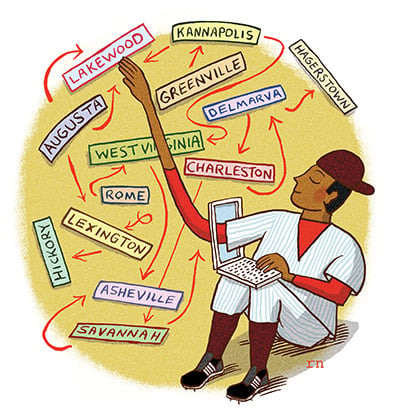
Baseball fans track batting records, errors, and everything else that happens on the field but rarely give thought to some of the sport’s most complex numbers— the ones required to get the players on the fields. The underappreciated challenge of scheduling each year’s thousands of professional ballgames is a complex business that one Whiting School researcher is now taking on with the help of students.
Baseball schedules are a daunting challenge because there are so many constraints. A team can’t play at home or away for too long. Travel distances have to be optimized. The list goes on and on. “You end up with this really difficult problem,” says Donniell Fishkind, an associate research professor in the Department of Applied Mathematics and Statistics.
That problem intrigued Fishkind when Tony Dahbura ’81, MS ’82, PhD ’84, interim director of JHU’s Information Security Institute, approached him to discuss the possibility of developing a new computer system for league scheduling. Dahbura also happens to be an owner of the Hagerstown Suns, a team in the South Atlantic League and affiliate of the Washington Nationals.
As a class assignment, the instructors created a fictitious minor league for students to schedule. Fishkind designed the guts of the computer program, and then the class added the tweaks. But Fishkind and Dahbura were thinking bigger too. A well-established company that includes a former JHU professor and an alumna uses a proprietary program to produce Major League Baseball schedules.
But in many cases minor league games are still scheduled bymhand—leading to major headaches and major limitations.
“We realized the size of the problem for the South Atlantic League was probably in reach,”Fishkind says, “so we coded it up.” Later he invited four undergraduate< engineering students who took a special interest in the class project to work with him.
It takes weeks to do the South Atlantic League schedule by hand, but the Hopkins team designed a computer program that handles the task in hours using an impressive supercomputer. As importantly, they can change a schedule with a few keystrokes and a few hours cooking on the supercomputer, or quickly determine if desired changes are impossible.
Fishkind can’t discuss specifics of the team’s programming approach until patents are established, but their techniques are related to those applied to airline scheduling. He’s also working with the university to explore the possibility of forming a company to market scheduling services. He’s already in discussions with the South Atlantic League and could work with other leagues and possibly someday Major League Baseball.
Undergraduate Jordan Pryor ’13, who worked on the project, likes the idea of leagues putting the system to use. “It would be awesome to go to a game and say, ‘The reason they’re playing right now is because we set the schedule up so they could play.’”




